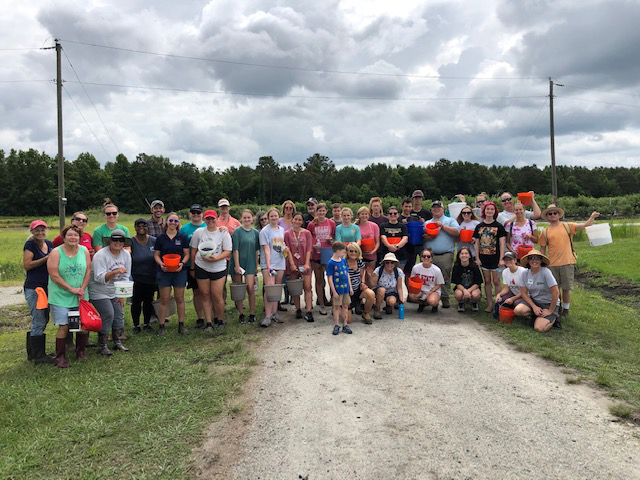Picking Blueberries for a Good Cause
go.ncsu.edu/readext?870493
en Español / em Português
El inglés es el idioma de control de esta página. En la medida en que haya algún conflicto entre la traducción al inglés y la traducción, el inglés prevalece.
Al hacer clic en el enlace de traducción se activa un servicio de traducción gratuito para convertir la página al español. Al igual que con cualquier traducción por Internet, la conversión no es sensible al contexto y puede que no traduzca el texto en su significado original. NC State Extension no garantiza la exactitud del texto traducido. Por favor, tenga en cuenta que algunas aplicaciones y/o servicios pueden no funcionar como se espera cuando se traducen.
Português
Inglês é o idioma de controle desta página. Na medida que haja algum conflito entre o texto original em Inglês e a tradução, o Inglês prevalece.
Ao clicar no link de tradução, um serviço gratuito de tradução será ativado para converter a página para o Português. Como em qualquer tradução pela internet, a conversão não é sensivel ao contexto e pode não ocorrer a tradução para o significado orginal. O serviço de Extensão da Carolina do Norte (NC State Extension) não garante a exatidão do texto traduzido. Por favor, observe que algumas funções ou serviços podem não funcionar como esperado após a tradução.
English
English is the controlling language of this page. To the extent there is any conflict between the English text and the translation, English controls.
Clicking on the translation link activates a free translation service to convert the page to Spanish. As with any Internet translation, the conversion is not context-sensitive and may not translate the text to its original meaning. NC State Extension does not guarantee the accuracy of the translated text. Please note that some applications and/or services may not function as expected when translated.
Collapse ▲Some serious behind-the-scenes science takes place at the NC State Horticultural Crops Research Station in Castle Hayne, where dedicated researchers are on an ongoing quest to improve the state’s blueberry crop.
They plant acres of blueberries, breeding for new varieties that produce higher yields, have improved disease and cold resistance, and have superior flavor. Each growing season, taste tests are conducted and data is studied to evaluate the most promising plants.
The station provides a valuable service for North Carolina blueberry farmers and consumers. What it hasn’t provided, though, is fruit. Extension exists to support growers, not compete with them, so the trial berries don’t get picked and sold.
“A lot of the fruit that’s grown at the research center doesn’t get harvested,” said Mark Seitz, director of the Extension center in Pender County. “The blueberry industry helps fund the research, and we don’t want to compete with the growers. There are lots of acres of varieties out there. If it doesn’t get picked, the bears and birds get it.”
Related: People attending the blueberry festival can tour the Horticultural Crops Research Station
Amy Mead, Extension area agent for natural resources and environmental education in Brunswick County, came up with an idea. Instead of leaving the fruit for the bears and birds, why not donate it?
“She used to work in New Hanover and had contacts at the Wilmington food bank,” Seitz said. “This was an untapped resource in terms of food for families in need.”

Extension staff and partners picked blueberries at the Horticultural Research Station in Castle Hayne on June 3, 2022.
Extension staff and partners, including NC State Extension Master Gardener volunteers, youth from area 4-H clubs and Topsail High School FFA students, held a gleaning day at the research center in 2021. They picked about 400 pounds of fruit and donated it to the Food Bank of Central and Eastern North Carolina.
In 2022, they doubled their efforts. Gleaning days were held June 3 and 10. Everything was hand-picked on the first day. The second provided a trial for the station’s mechanical harvester.
“We had 50 youth and adult volunteers that picked blueberries,” Mead said. “The research station staff demonstrated the use of the mechanical harvester and then we took those berries back to be mechanically sorted. The kids especially were fascinated by the sorting machine that separates out the overripe and green berries.”
Not everything can be picked — plants that are part of disease or pest management trials are off limits, for example — but it was still a productive time.
“In total over the two days, we were able to harvest 770 pounds of blueberries,” Mead said. “These blueberries were given to the Food Bank of Central and Eastern North Carolina in Wilmington where they will be distributed to partner organizations that help our food insecure neighbors.”

